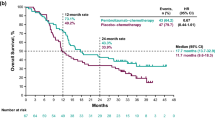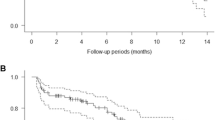Abstract
Background
Panitumumab is a fully human, monoclonal antibody against the epidermal growth factor receptor. Previous studies in non-Japanese patients with solid tumors showed that panitumumab exhibited nonlinear pharmacokinetics, was well tolerated (skin toxicities were the most common treatment-related adverse events), and had antitumor activity in some patients. This open-label, phase 1 study investigated panitumumab safety and pharmacokinetics in Japanese patients.
Methods
Japanese patients with advanced solid tumors were enrolled into one of three sequential panitumumab dose cohorts (cohort 1, 2.5 mg/kg weekly; cohort 2, 6.0 mg/kg every 2 weeks; and cohort 3, 9.0 mg/kg every 3 weeks) and received panitumumab until disease progression or drug intolerability. Safety endpoints included the incidence of adverse events, changes in laboratory values, and the appearance of anti-panitumumab antibodies. Serial pharmacokinetic samples were collected after the first and third doses of panitumumab. Tumors were assessed at week 8 and every 8 weeks thereafter.
Results
Eighteen patients (6 per cohort) were enrolled. No dose-limiting toxicities, investigator-reported infusion reactions, or deaths occurred. Seven patients had grade-3/4 adverse events; fatigue and anorexia were most common. The most common skin toxicities were rash and acneiform dermatitis. No neutralizing anti-panitumumab antibodies were detected. Panitumumab exhibited nonlinear pharmacokinetics, and antitumor activity was observed in 31% (4/13) of the patients with colorectal cancer.
Conclusion
In Japanese patients with solid tumors, panitumumab was well tolerated, demonstrated pharmacokinetic and safety profiles similar to those observed previously in non-Japanese patients, and exhibited encouraging antitumor activity in patients with colorectal cancer.
Similar content being viewed by others
References
Arteaga CL (2001) The epidermal growth factor receptor: from mutant oncogene in nonhuman cancers to therapeutic target in human neoplasia. J Clin Oncol 19:32S–40S
Gullick WJ (1991) Prevalence of aberrant expression of the epidermal growth factor receptor in human cancers. Br Med Bull 47:87–98
Mendelsohn J, Baselga J (2003) Status of epidermal growth factor receptor antagonists in the biology and treatment of cancer. J Clin Oncol 21:2787–2799
Foon KA, Yang XD, Weiner LM, et al. (2004) Preclinical and clinical evaluations of ABX-EGF, a fully human anti-epidermal growth factor receptor antibody. Int J Radiat Oncol Biol Phys 58:984–990
Jakobovits A (1995) Production of fully human antibodies by transgenic mice. Curr Opin Biotechnol 6:561–566
Jakobovits A, Amado RG, Yang X, et al. (2007) From XenoMouse technology to panitumumab, the first fully human antibody product from transgenic mice. Nat Biotechnol 25:1134–1143
Rowinsky EK, Schwartz GH, Gollob JA, et al. (2004) Safety, pharmacokinetics, and activity of ABX-EGF, a fully human anti-epidermal growth factor receptor monoclonal antibody in patients with metastatic renal cell cancer. J Clin Oncol 22:3003–3015
Weiner LM, Belldegrun AS, Crawford J, et al. (2008) Dose and schedule study of panitumumab monotherapy in patients with advanced solid malignancies. Clin Cancer Res 14:502–508
Lynch TJJ, Kim ES, Eaby B, et al. (2007) Epidermal growth factor receptor inhibitor-associated cutaneous toxicities: an evolving paradigm in clinical management. Oncologist 12:610–621
Berlin J, Neubauer P, Swanson WG, et al. (2006) Panitumumab antitumor activity in patients (pts) with metastatic colorectal cancer (mCRC) expressing ≥10% epidermal growth factor receptor (EGFr). J Clin Oncol 24: abstract #3548
Berlin J, Posey J, Tchekmedyian S, et al. (2007) Panitumumab with irinotecan/leucovorin/5-fluorouracil for first-line treatment of metastatic colorectal cancer. Clin Colorectal Cancer 6:427–432
Hecht JR, Patnaik A, Berlin J, et al. (2007) Panitumumab monotherapy in patients with previously treated metastatic colorectal cancer. Cancer 110:980–988
Mitchell EP, Hecht JR, Baranda J, et al. (2007) Panitumumab activity in metastatic colorectal cancer (mCRC) patients (pts) with low or negative tumor epidermal growth factor receptor (EGFr) levels: An updated analysis. J Clin Oncol 25: abstract #4082
Van Cutsem E, Peeters M, Siena S, et al. (2007) Open-label phase III trial of panitumumab plus best supportive care compared with best supportive care alone in patients with chemotherapyrefractory metastatic colorectal cancer. J Clin Oncol 25:1658–1664
(2008) Vectibix™® Prescribing Information. Amgen, Thousand Oaks, CA
Guideline for Clinical Evaluation of Anticancer Drugs (1991) PAB/NDD Notification No. 9; February 4, 1991
Lofgren JA, Dhandapani S, Pennucci JJ, et al. (2007) Comparing ELISA and surface plasmon resonance for assessing clinical immunogenicity of panitumumab. J Immunol 178:7467–7472
Van Cutsem E, Siena S, Humblet Y, et al. (2008) An open-label, single-arm study assessing safety and efficacy of panitumumab in patients with metastatic colorectal cancer refractory to standard chemotherapy. Ann Oncol 19:92–98
Therasse P, Arbuck SG, Eisenhauer EA, et al. (2000) New guidelines to evaluate the response to treatment in solid tumors. European Organization for Research and Treatment of Cancer, National Cancer Institute of the United States, National Cancer Institute of Canada. J Natl Cancer Inst 92:205–216
(2008) Erbitux⊥M® Prescribing Information. Imclone Systems, Branchburg NJ
Schrag D, Chung KY, Flombaum C, et al. (2005) Cetuximab therapy and symptomatic hypomagnesemia. J Natl Cancer Inst 97:1221–1224
Mitchell EP, Lacouture M, Shearer H, et al. (2008) Updated results of STEPP, a phase 2, open-label study of pre-emptive versus reactive skin toxicity treatment in metastatic colorectal cancer (mCRC) patients receiving panitumumab + FOLFIRI or irinotecan-only chemotherapy as second-line treatment. 10th World Congress on Gastrointestinal Cancer. 25–28 June 2008, Barcelona, Spain
Tejpar S, Piessevaux H, Claes K, et al. (2007) Magnesium wasting associated with epidermal-growth-factor receptor-targeting antibodies in colorectal cancer: a prospective study. Lancet Oncol 2:387–394
Tan AR, Moore DF, Hidalgo M, et al. (2006) Pharmacokinetics of cetuximab after administration of escalating single dosing and weekly fixed dosing in patients with solid tumors. Clin Cancer Res 12:6517–6522
Baselga J, Pfister D, Cooper MR, et al. (2000) Phase I studies of anti-epidermal growth factor receptor chimeric antibody C225 alone and in combination with cisplatin. J Clin Oncol 18:904–914
Wang KL, Wu TT, Choi IS, et al. (2007) Expression of epidermal growth factor receptor in esophageal and esophagogastric junction adenocarcinomas: association with poor outcome. Cancer 109: 658–667
Janmaat ML, Gallegos-Ruiz MI, Rodriguez JA, et al. (2006) Predictive factors for outcome in a phase II study of gefitinib in second-line treatment of advanced esophageal cancer patients. J Clin Oncol 24:1612–1619
Benvenuti S, Sartore-Bianchi A, Di Nicolantonio F, et al. (2007) Oncogenic activation of the RAS/RAF signaling pathway impairs the response of metastatic colorectal cancers to anti-epidermal growth factor receptor antibody therapies. Cancer Res 67: 2643–2648
Amado RG, Wolf M, Peeters M, et al. (2008) Wild-type KRAS is required for panitumumab efficacy in patients with metastatic colorectal cancer. J Clin Oncol 26:1626–1634
Author information
Authors and Affiliations
Corresponding author
About this article
Cite this article
Doi, T., Ohtsu, A., Tahara, M. et al. Safety and pharmacokinetics of panitumumab in Japanese patients with advanced solid tumors. Int J Clin Oncol 14, 307–314 (2009). https://doi.org/10.1007/s10147-008-0855-2
Received:
Accepted:
Published:
Issue Date:
DOI: https://doi.org/10.1007/s10147-008-0855-2




